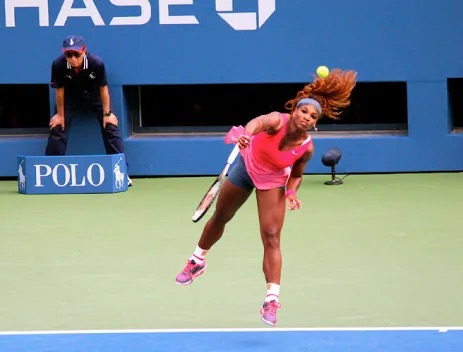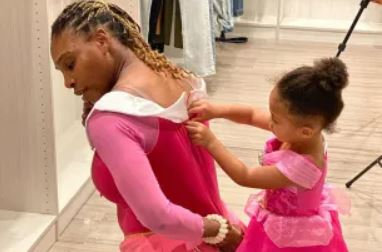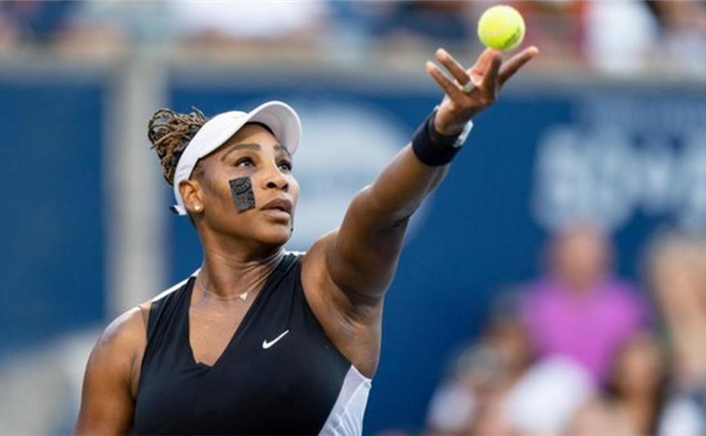There has been much chatter about Serena Williams’ decision to exit tennis. I want to think about the contextual and impactful surround of her decision — to enlarge her family and choose pregnancy and how it elicits deeper conversations about our lives. Choice is crucial here when enslaved Black women had none concerning their bodily integrity.
Serena’s Black body is defined by a racist misogyny that too often sees her as angry, as a threat, but also erases her and makes her invisible. Black women are four times as likely as white women to die in childbirth and suffer health conditions due to a racist medical system — that cannot be reduced to class privilege. Her own complications in childbirth have been connected to this vulnerability. And yet, despite all this, she chooses to birth a child again.

As well, Serena chooses birthing a second child in a society where women — every one of us — have lost the right to abortion, where our choices have been stripped down so that we are not full citizens with legal rights to our bodies. Serena’s decision puts the issue of “choice” in bold, whatever the consequences might be. Choice about pregnancy and access to the health care that makes it possible, and access to abortion as well, is crucial to a meaningful self-determined life. And so is an end to the extreme violence and hatred towards Black trans women. Let us keep this surround in mind.
Post-Partum Serena
I have been a huge Serena fan for decades. I have always celebrated the way she stands her ground, fought for her individual space as a Black woman, most especially on the tennis court, and then shared her pregnancy and her post-partum body struggle for all the world to witness. I was rooting for her during her 2018 comeback when she played Naomi Osaka.
I wondered if Serena would be able to push her body far enough to win against Naomi, a terrific 20-year-old player. Would Serena’s skill and strength be able to reclaim her fabulous steely body back from pregnancy and emergency surgeries because of embolisms, for elite tennis? She had only had about a year to regain/reclaim her former body — and at this time she was 36, and aging in the world of professional sports.

After Serena had given birth — and after her delivery and recovery from a high-risk caesarean, she worked to return her body to its superhuman status. I read carefully about her health and listened to all her podcasts of this process. I really wanted Serena to overcome the huge assault her body took in pregnancy.
In the HBO documentary about this post-partum training Serena says she never knew how hard it would be to come back. As someone who also has been pregnant with complications, I knew what she meant. I knew how foreign her own body must feel even though I do not play elite sports.
Serena could not reclaim her former body sufficiently, because as she says, she does not simply play tennis, she wins.
Fast forward to today. Serena announces she will be leaving the sport. She said she is not retiring, but rather evolving and yet the headline reads: “Serena Williams Announces Her Retirement from Tennis.” Another headline claims Serena made her choice: family over tennis. Yet another headline says Serena, “bigger than any label, is now something new: Relatable.” Why say this? And relatable? She is a billionaire and gets to mother with whatever support she might need.
This is an important time to point out the elitism and yet the connectivity of Serena. Economic inequality is at the heart of much of the patriarchal lives that most people still live, re Serena herself. Pregnancy ties people to their bodies — that does not determine, but clearly defines, choices and demands.

What is there to take from this moment? Yes, we all should be allowed to evolve. We should recognize that pregnancy can be dangerous and hard to recoup from, but this is true in a different way if you are a waitress, or administrative assistant, or farm worker, or day care worker, or professor, than if you are an elite sportswoman. You can work when you are exhausted, or nauseous, or overweight in most of these jobs. You cannot if you are Serena Williams, tennis superstar. The perfection of your body is at the heart of the game.
Pregnancy and Most of Us
For most women, pregnancy is absorbed into our lives, even when it has been difficult. There is little choice if one wants children and needs or wants to earn wages. But there are times it cannot be absorbed and ignored, and that is when your body is your full ticket to stardom as it is in elite sports. One’s body is everything. It is important to not confuse these issues. Most women work despite pregnancy and their responsibility for early childhood care. And the right to abortion is central to choice making, whatever the decision.

A post-pregnant body, for most people, is a changed body, maybe for years. Maybe for forever. I watched and rooted for Serena as she trained and lost weight and practiced post-partum. But all her fierce energy and commitment to training was not enough. However, the problem is not pregnancy, it is elite sports and its exclusionary demands. Why do we support sports that defy a healthy body? A peaceful mind? Why demand such super-human excellence. Let us ask Simone Biles or Naomi Osaka, both of whom have spoken out about the devastating toll it all takes.
I support Serena in her choices because they are hers to make. I only wish Serena had said more than she was leaving competitive tennis and evolving toward her next self — another child, attention to her investments, and what will come next. I wish she also might have said, because she can: that the sport I have devoted my life to is not available to a body that is aging, a body that will be challenged again by pregnancy and its unknowns. So, as I leave, I wonder if we could rethink how tennis could evolve itself —into a sport more inclusive of a variety of talent and capacity that allows our bodies to evolve with it.
And who knows, maybe tennis with more differing body abilities and capacities would become more relatable and more exciting. After all, you develop such daunting skills while pregnant and while birthing. If given the chance to fully choose, new possibilities might emerge.
Zillah Eisenstein is a noted international feminist writer and activist and Professor Emerita, Political Theory, Ithaca College. She is the author of many books, including “The Female Body and the Law” (UC Press, 1988), which won the Victoria Schuck Book Prize for the best book on women and politics; “Hatreds” (Routledge., 1996), “Global Obscenities” (NYU Press, 1998), “Against Empire” (Zed Press, 2004), and most recently, “Abolitionist Socialist Feminism” (Monthly Review Press, 2019).

